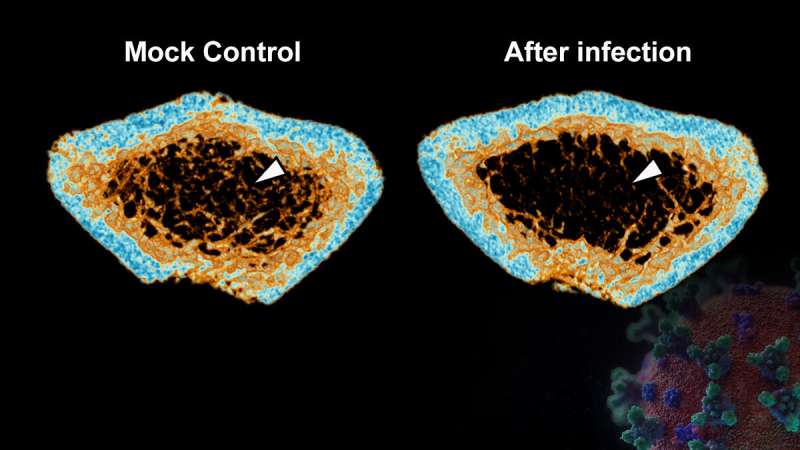SARS-CoV-2 infection induces severe inflammatory bone loss in Syrian hamsters

A research team led by Professor Kelvin Yeung Wai-kwok and Dr. Jasper Chan Fuk-woo from the LKS Faculty of Medicine, The University of Hong Kong (HKUMed) discovered that SARS-CoV-2 infection can cause inflammatory activation of bone resorption cells, leading to severe bone loss during the acute and post-recovery phases of COVID-19. The findings of this study provide insights into the possible long-term complications of COVID-19 and have been published in the international peer-reviewed journal Nature Communications.
In addition to pulmonary infection, extrapulmonary complications of different organ systems in the long-term post-acute sequelae of SARS-CoV-2 infection, or "long COVID," have been increasingly recognized in patients with COVID-19. However, the full spectrum of clinical manifestations, especially the influence of SARS-CoV-2 infection on bone metabolism, has yet to be fully understood.
To study the effects of SARS-CoV-2 infection on bone metabolism, Syrian hamsters were intranasally challenged with SARS-CoV-2 and then their bone tissues were collected serially after the infection. Using three-dimensional micro-computerized tomography (μCT) scans, the research team identified that SARS-CoV-2 infection had induced severe bone loss from 20% to 50% progressively in particular to the trabecular bone in the long bones and lumbar vertebrae. This effect extended from the acute phase to the chronic phase of infection. The pathological osteopenia was found to be associated with the inflammatory activation of osteoclasts (a kind of cell responsible for bone resorption). The cytokine dysregulation induced by SARS-CoV-2 not only upregulated osteoclastic differentiation in bone tissues, but also triggered an amplified pro-inflammatory cascade in the skeletal tissues to augment their pro-osteoclastogenesis effects.
The research team is the first in the world to report the effects of SARS-CoV-2 on bone metabolism using a well-established Syrian hamster model that closely mimics COVID-19 in humans. The findings indicate that the pathological bone loss may be an important but neglected complication, which warrants more extensive investigations during the long-term follow-up of COVID-19 patients.
More information: Wei Qiao et al, SARS-CoV-2 infection induces inflammatory bone loss in golden Syrian hamsters, Nature Communications (2022). DOI: 10.1038/s41467-022-30195-w




















